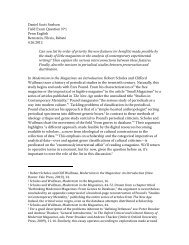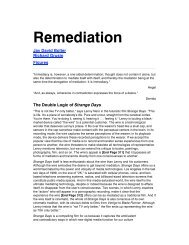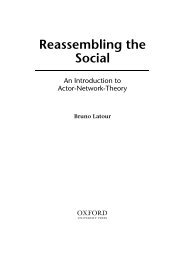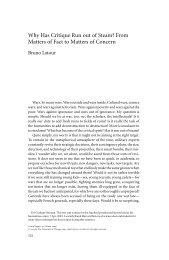The Exploit: A Theory of Networks - asounder
The Exploit: A Theory of Networks - asounder
The Exploit: A Theory of Networks - asounder
You also want an ePaper? Increase the reach of your titles
YUMPU automatically turns print PDFs into web optimized ePapers that Google loves.
Nodes 81<br />
Perhaps what is most instructive about this view <strong>of</strong> biopolitics and<br />
resistance is that life - resistance is not exclusive to human agencies and<br />
actions, especially when considered from the perspective <strong>of</strong> networks<br />
as living networks. Life - resistance puts forth the difficult, sometimes<br />
frustrating proposition that “life” is not always synonymous with the<br />
limited cause - and - effect relations usually attributed to human agencies;<br />
in this sense, networks—or living networks—contain an anon -<br />
y mity, a nonhuman component, which consistently questions common<br />
notions <strong>of</strong> action, causality, and control.<br />
<strong>The</strong> <strong>Exploit</strong><br />
In the non - protocological arenas, progressive political change is generated<br />
through struggle, through the active transfer <strong>of</strong> power from<br />
one party to another. For example, the institution <strong>of</strong> the forty - hour<br />
workweek was the result <strong>of</strong> a specific shift in power from capital to<br />
labor. To take another example, women’s liberation is the result <strong>of</strong><br />
specific transfers <strong>of</strong> power in the areas <strong>of</strong> law (suffrage, abortion,<br />
birth control), in the expectations surrounding domestic labor, biological<br />
and social ideas about gender, and so on.<br />
Yet within protocological networks, political acts generally happen not<br />
by shifting power from one place to another but by exploiting power differentials<br />
already existing in the system.<br />
This is due mainly to the fundamentally informatic nature <strong>of</strong> networks.<br />
Informatic networks are largely immaterial. But immaterial does<br />
not mean vacillating or inconsistent. <strong>The</strong>y operate through the brutal<br />
limitations <strong>of</strong> abstract logic (if/ then, true or false).<br />
Protocological struggles do not center around changing existent technologies<br />
but instead involve discovering holes in existent technologies and<br />
projecting potential change through those holes. 59 Hackers call these holes<br />
“exploits.”<br />
Thinking in these terms is the difference between thinking socially<br />
and thinking informatically, or the difference between thinking









